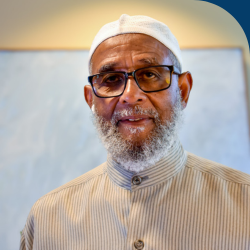
Growing up, I developed a friendship with a child playing on the playground. As we grew older, we continued to gravitate to each other, noticing that we shared similar values. We didn’t allow ourselves to be negatively influenced by others. We both were stable and firm enough in our values that when peers attempted to sway us in negative directions we set limits and we didn’t deviate. This can be very challenging for young boys trying to exist in an environment where the weak fall prey.
We lost contact with one other during a portion of our teenage years. Neither of us had any contact with the other’s family or home life. During my adolescence I grew up as a Christian and in college, I was introduced to Islam. As I matured in the Islamic faith, I developed a love for da’wah, a term that means “call to faith.” We would go door-to-door and walk through communities sharing the message of Islam. One morning we were out doing da’wah and we happened to be on the same street with a group of Jehovah’s Witnesses sharing their message. These encounters were always interesting because we found them sincere in their beliefs.
To my surprise, that morning, my childhood friend stepped out of the group of Jehovah’s Witnesses. We both stood for a minute gazing at one another, then realizing that we were looking into the eyes of two childhood friends who had both supported one another when challenged by others to do wrong.
We immediately embraced each other, both groups observing that we both were proud and happy for each other. We both were on the path to call our people to what we believed was beneficial to live a productive life. We exchanged pamphlets and offered each other words of encouragement. When we redirected our attention, we realized that after our embrace, both groups approached each other, hands outstretched, and exchanging pamphlets along with words of encouragement.
After participating with ICJS Congregational Leaders Fellowship (CLF), I appreciate that moment, reuniting with my friend, even more, embracing each other, only identifying with the good we saw in each other.
I must admit that the CLF was a challenging experience as it made me take a closer look into my own faith. It also forced me to determine my approach to answering questions posed by sincere seekers of understanding. My challenge was finding a way to be careful and purposeful with my words and not confusing my understanding of revelation and Almighty God’s actual conversation with mankind. Humans are incapable of conveying the majesty and mastery of the speech of Allah. Our words cannot do it justice. We believe that The Holy Qur’an is the direct speech of God given to The Angel Jibril related to his Prophet Muhammad (peace be upon him) to convey to mankind. The test for those given this task of entering this dialogue is not to allow one’s ego to override the trust of conveying the speech of Allah with purity. This purity must consist of sincere intentions and a willingness to be vulnerable, void of egotism, personal gain, and false assumptions.
It was enlightening and gratifying to hear others explain their religious thoughts with love and devotion. As I witnessed members of various groups expose themselves to the scrutiny of others, allowing themselves to be vulnerable, the element of trust materialized. Participants began to feel comfortable expressing their love of faith and simultaneously questioning aspects of their own belief. Members began to offer experiences meant to benefit each participant’s spiritual journey without diminishing the convictions of any group member. How wonderful the community would be if this model was implemented consciously throughout the world.
This interfaith experience also enables one to navigate an inner faith journey. Upon listening and learning from the participants, I came to realize that the challenges faced within our various faith communities are similar in nature. How do we handle differences of opinions and what is the proper etiquette for argument? Once we are capable of converging on this quest in the pursuit of truth with purity of intention, we allow others to participate free of harm.
Reflecting on Islamic history, there was a period when multiple prophets or messengers lived in the same period and regions. If we examine these periods, there was no conflict or incongruence within their message. Interaction between different faiths should allow us to bring forth our commonalities. I think back fondly to my encounter with my childhood friend and how our friendship made possible a genuine interreligious moment of community between members of our two faiths.
I have determined that for me, my interfaith pursuit is to seek trust by allowing myself to be vulnerable in the midst of others, in hopes to seek understanding—and in return to be understood.
 Mustafa Sharif is from the Gwynn Oak Islamic Community and was a member of the 2023 ICJS Congregational Leaders Leaders Fellowship. Opinions expressed in blog posts by the ICJS Congregational Leader Fellows are solely the author’s. ICJS welcomes a diversity of opinions and perspectives.
Mustafa Sharif is from the Gwynn Oak Islamic Community and was a member of the 2023 ICJS Congregational Leaders Leaders Fellowship. Opinions expressed in blog posts by the ICJS Congregational Leader Fellows are solely the author’s. ICJS welcomes a diversity of opinions and perspectives.